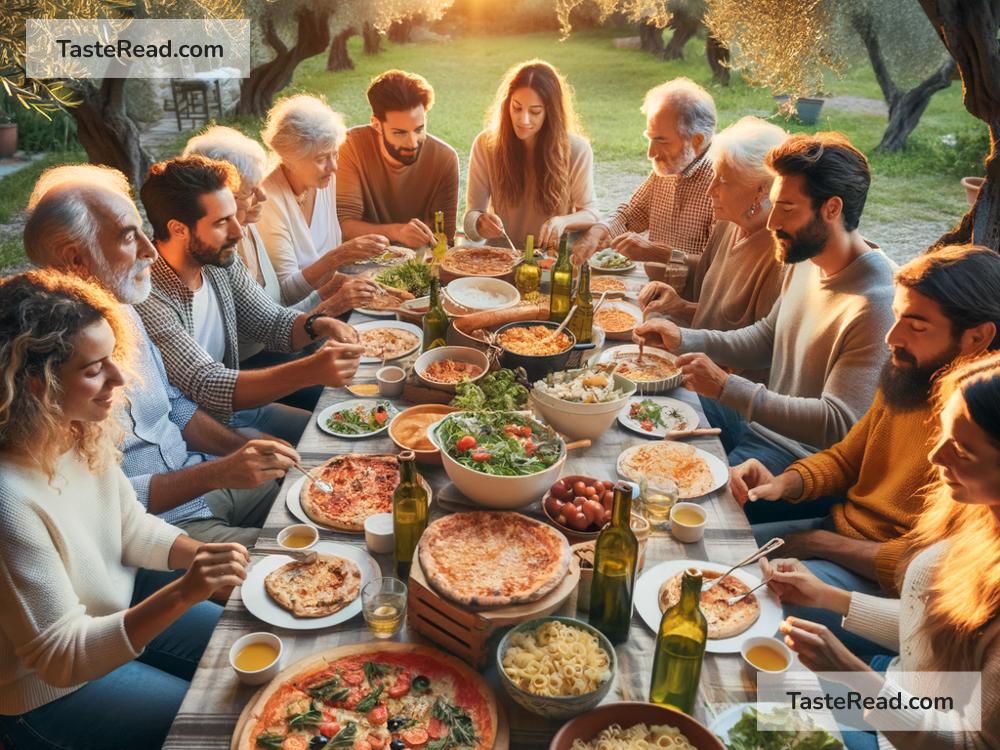Title: The Heart of the Home: Italian Family Traditions and Gatherings Through Food
In Italian culture, food is much more than just a necessity for survival; it’s the glue that binds families together. Italian family traditions and gatherings are often centered around the kitchen table, where generations share not only meals but also stories, laughs, and life’s important lessons. This blog explores how food plays an integral part in these Italian traditions, creating memories that last a lifetime.
The very soul of Italian family life can be found in its culinary traditions. From the bustling streets of Rome to the serene landscapes of Tuscany, the significance of food in bringing people together is unmistakable. It’s not just about eating; it’s a form of communication, a way of expressing love, and a means for perpetuating family heritage.
The Sunday Feast
One of the most enduring traditions in Italian households is the Sunday lunch. This isn’t just any meal; it’s a grand affair, often stretching for several hours, where multiple generations gather around the table. The air is filled with the aroma of simmering sauces, freshly baked bread, and roasted meats. The Sunday feast symbolizes unity and gratitude, offering a time to catch up, celebrate achievements, and nurture family bonds.
The dishes served during these gatherings are prepared with care, each recipe passed down from one generation to the next, carrying stories and memories within them. This continuity ensures that ancestors’ legacy lives on, as youngsters learn not just the techniques but also the values that come with them, such as patience, precision, and passion.
Rituals and Celebrations
Italian life is marked by a beautiful tapestry of festivals and celebrations, each with its distinct set of culinary traditions. Christmas, Easter, weddings, and even the simple act of welcoming a new neighbor or celebrating a successful harvest revolve around specific dishes and rituals. For example, Christmas Eve sees the preparation of the ‘Feast of the Seven Fishes’, a meal symbolizing abstinence from meat before the grand feast on Christmas Day. Easter, meanwhile, might feature ‘Pastiera Napoletana’, a sweet wheat pie that represents new beginnings.
These celebrations are an opportunity to teach the younger members about their heritage, the importance of community, and the joy that comes from sharing. The kitchen becomes a classroom where life lessons are imparted alongside culinary skills.
The Daily Rituals
It’s not just the grand occasions that highlight the role of food in Italian family traditions; daily rituals also emphasize its centrality. Meals are rarely skipped, and even the simplest dish is treated with respect. Families make it a point to gather for dinner, sharing their day’s experiences over a meticulously prepared meal. This daily coming together reinforces the importance of family, ensuring that despite the day’s challenges, the family unit remains strong and cohesive.
Moreover, the process of meal preparation itself is a communal activity. Shopping for fresh ingredients at local markets, selecting the perfect produce, and engaging in the art of cooking are all moments of connection and learning. These activities foster a profound respect for food, from its source to the table, and instill a sense of responsibility towards nature and the community.
Food as a Language of Love
In Italian culture, food is often described as a language of love. The care put into preparing a meal is a form of unspoken affection, a way to nurture and comfort. It’s no coincidence that some of the most heartfelt moments in Italian families occur around the dining table, where the fruits of this labor of love are shared.
This culinary affection extends beyond immediate family to encompass friends, neighbors, and even strangers. Invitations to dine are gestures of welcome and inclusion, embodying the Italian philosophy of ‘la dolce vita’ – the sweet life, where joy comes from appreciating the simple pleasures, like good food and great company.
Conclusion
In summary, food in Italian culture is far more than sustenance; it’s a celebration of life itself. Through the rituals of cooking and dining, families pass down traditions, preserve their heritage, and strengthen their bonds. These gatherings around the kitchen table are where values are imparted, stories are told, and love is shared, making food an indispensable part of Italian family life.
As we explore the rich tapestry of Italian culinary traditions, it becomes clear that the true essence of Italy lies not just in its art, history, or landscapes, but in the simple, joyful gatherings of family and friends around a table laden with lovingly prepared dishes. In this way, food is indeed at the heart of Italian family traditions and gatherings, weaving a thread of continuity and connection that spans generations.


